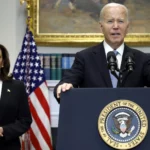U.S. President Joe Biden’s top advisor on the trilateral AUKUS military alliance between Australia, the United Kingdom, and the United States is set to leave the administration soon after the leaders of the three countries meet in California next week to announce Australia’s forthcoming nuclear submarine program, four people familiar with the move told Foreign Policy.
It was not immediately clear when James Miller, who has been the U.S. National Security Council’s top official spearheading the alliance, would depart the role. This position was newly established role only 15 months ago. Miller, a former top U.S. Defense Department official, leaves as the AUKUS alliance shifts into a second phase focused on hypersonic missiles, quantum computing, artificial intelligence, and cybersecurity cooperation.
The AUKUS pact, signed in September 2021, is one of the Biden administration’s hallmark initiatives to counter China’s growing military footprint in the Indo-Pacific as it gears up toward an era of great-power competition with Beijing. China, which has the world’s largest navy, now operates around 79 submarines, a few more than the U.S. Navy and about seven times what the British Royal Navy has in its inventory. AUKUS is meant to give Australia a nuclear sub capacity of its own—eventually.
Miller’s role is expected to be folded into the portfolio of Kurt Campbell, Biden’s top Asia hand at the National Security Council, sources said. In his role under U.S. National Security Advisor Jake Sullivan, Miller oversaw programs in the departments of Defense, Energy, and State related to AUKUS, and he took on a 90-day sprint to determine whether the nascent alliance could expand into new lanes.
Miller’s departure comes amid a wider shake-up in Biden’s foreign-policy team, with veteran China experts leaving or moving to new posts. Biden’s top National Security Council aide on China, Laura Rosenberger, is leaving her post to become the new chair of the American Institute in Taiwan, a U.S. government-funded nonprofit that acts as the de facto U.S. diplomatic mission to the self-governing island. Rosenberger will be replaced by Sarah Beran, a top aide at the State Department to U.S. Secretary of State Antony Blinken.
The move could give the Pentagon more ability to frame the future trajectory of the AUKUS alliance, with the Biden administration tapping Abraham Denmark last year to lead an advisory group of about 20 to 30 officials under Defense Secretary Lloyd Austin on the nascent grouping. Miller will remain available to periodically consult the administration. He is set to leave the administration at a possible high-water mark for AUKUS: the end of an 18-month sprint that will allow Canberra to buy five U.S.-made Virginia-class nuclear-powered submarines. This occurs while Australia’s own industrial base, which was churning out diesel-electric submarines until the early 2000s, builds a fleet of nuclear-powered vessels from a British design.
Miller played an outsized role in putting the AUKUS concept into action, according to current and former U.S. officials, an immensely complicated undertaking that involved working through regulatory red tape among foreign allies and transferring highly sensitive nuclear technology to a non-nuclear state, Australia, in a program that experts say breaks precedent on global nonproliferation.
“What makes AUKUS so challenging is you have to coordinate with the defense industrial base, Pentagon, the armed services, the Hill, the State Department, and these countries all at once,” said Jacob Stokes, a defense expert at the Center for a New American Security.
“Having someone who understood how the interagency works and how to move it on something so challenging—in Washington, Canberra, and London—and really know how to push the bureaucracy was so important for this first 18-month phase,” he added.
Source : ForeignPolicy















